Customer Support Management Solutions Worth Considering
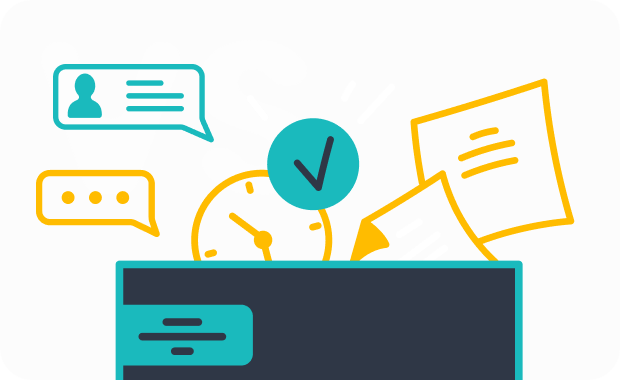
Businesses in 2025 should consider customer support management solutions that harness AI, omnichannel capability, and deep CRM integration for superior service. Many companies now adopt platforms with service automation, unified customer data, and analytics. Top solutions include Sobot, which provides an all-in-one contact center platform, Sobot AI, and Sobot call center tools to optimize customer experience and service. Companies in retail and e-commerce lead this trend, aiming for higher customer satisfaction and retention. Selecting robust customer support software directly impacts key service metrics, including customer satisfaction and loyalty.
Customer service platforms with advanced CRM and omnichannel features drive measurable gains in customer experience management and business growth.
| Metric Name | Description & Impact on Business Performance Metrics |
|---|---|
| Customer Satisfaction Score (CSAT) | Measures immediate satisfaction with service interactions; directly influences customer satisfaction. |
| Net Promoter Score (NPS) | Measures loyalty and likelihood to recommend; effective service improves NPS and retention. |
| Customer Effort Score (CES) | Assesses ease of issue resolution; reducing effort increases loyalty. |
Reflect on your customer experience goals and how the right CRM-powered service solution can help your team deliver exceptional support.
Top Customer Support Management Solutions
Leading Platforms in 2025
Customer support management continues to evolve rapidly. In 2025, businesses rely on advanced customer service software to deliver seamless support experiences. Companies choose platforms that integrate CRM software, AI, and omnichannel capabilities. These platforms help organizations manage customer interactions efficiently and improve service quality.
Sobot stands out as a leader in customer support management. The company offers all-in-one customer service software that unifies voice, chat, email, and social media channels. Sobot’s platform supports over 10,000 brands across industries such as retail, finance, gaming, and education. The system handles more than 6 million online communications and 3 million phone calls daily, demonstrating robust scalability and reliability. Sobot’s stability rate reaches 99.99%, ensuring uninterrupted service for global enterprises (Sobot Official Website).
Modern customer support software platforms focus on deep CRM integration. They aggregate customer data from multiple channels, creating unified profiles for each customer. This approach enables agents to access real-time insights and deliver personalized support. Companies benefit from reduced resolution times and improved customer satisfaction scores.
AI-powered features have become essential in customer support management. Platforms use AI to automate ticket routing, draft responses, and summarize conversations. These tools boost agent productivity and accuracy. Sobot’s ticketing system leverages AI to automate workflows, manage SLAs, and provide trusted analytics. The system supports multilingual ticketing, allowing businesses to serve customers worldwide (Sobot Ticketing System).
Omnichannel support remains a top priority for businesses. Leading customer service software consolidates interactions from email, chat, phone, and social media into a single workspace. Sobot’s omnichannel solution enables agents to manage all customer inquiries efficiently. The platform integrates with popular business tools, including Salesforce and Shopify, streamlining operations and enhancing service delivery (Sobot Omnichannel Solution).
Companies also seek customer support management solutions that offer automation and workflow builders. These features help organizations streamline repetitive tasks, such as ticket assignment and SLA management. Platforms provide bulk data management and customizable triggers, giving businesses greater control over service operations.
User experience plays a critical role in platform selection. Vendors update their user interfaces to support agent productivity and customer self-service. Offline capabilities and industry-specific apps further enhance flexibility. Sobot’s customer service software provides a unified workspace, smart notifications, and categorized templates, making it easy for agents to manage tickets and respond quickly.
Tip: Businesses should evaluate customer support software based on scalability, integration capabilities, and AI-driven intelligence to ensure long-term success.
What Sets Them Apart
Top customer support management platforms in 2025 distinguish themselves through innovation and operational excellence. AI-powered chatbots provide instant assistance, automating responses and improving engagement speed. Sobot’s AI chatbot offers 24/7 availability and multilingual support, enabling customers to resolve issues independently.
Platforms use AI-driven quality management tools to analyze every customer interaction. These tools identify coaching opportunities and detect service trends, helping organizations maintain high standards. Sobot’s analytics dashboard delivers comprehensive performance insights, allowing managers to optimize team configurations and improve service quality.
Workforce optimization has become a key differentiator. AI-enhanced tools forecast demand and dynamically align staffing with customer support needs. Predictive analytics enable businesses to resolve issues before they escalate, reducing customer effort and increasing loyalty.
Holistic customer data aggregation sets leading platforms apart. By consolidating information from multiple channels, companies create 360-degree profiles for each customer. Agents access complete histories and preferences, enabling proactive engagement. Sobot’s unified customer ID feature displays all relevant data next to each ticket, streamlining support processes.
Open integration platforms empower businesses to build custom AI solutions. Advanced APIs, such as OpenAI’s GPT-4.1, support natural language understanding and multi-step reasoning. Sobot’s platform integrates with major CRM software and e-commerce systems, providing flexibility for diverse business needs.
Automation and workflow builders enhance operational efficiency. Platforms automate ticket routing, SLA reminders, and time-triggered actions. Sobot’s ticketing system uses custom triggers and categorized templates to simplify ticket management. Agents save time with canned responses and ticket merging features.
Multi-channel support remains essential. Platforms consolidate customer service across email, chat, phone, social media, and SMS. Sobot’s omnichannel solution ensures customers can reach support through their preferred channels, improving satisfaction and retention.
AI-assisted agent support boosts productivity. Tools help agents draft replies, fill forms, and summarize conversations. Sobot’s workspace unifies messages, tickets, and customer data, enabling agents to respond accurately and efficiently.
The following table highlights key features that set leading customer support management platforms apart:
| Feature | Description |
|---|---|
| AI-powered chatbots | Provide instant assistance and automate responses, improving customer engagement speed. |
| AI-driven quality management | Analyze all customer interactions to identify coaching opportunities and detect trends. |
| AI-enhanced workforce optimization | Use demand forecasting to dynamically align staffing with customer support needs. |
| Holistic customer data aggregation | Consolidate data from multiple channels into unified 360-degree profiles. |
| Open integration platforms | Allow custom AI solutions tailored to business needs, leveraging advanced APIs. |
| Automation and workflows | Streamline repetitive tasks such as ticket routing and SLA management. |
| Multi-channel support | Consolidate support across email, chat, phone, social media, and SMS. |
| AI-assisted agent support | Help agents draft replies, fill forms, and summarize conversations. |
| Predictive analytics | Enable preemptive issue resolution by forecasting potential problems. |
Sobot’s customer support software incorporates these innovations, helping businesses achieve higher customer satisfaction and loyalty. The platform’s stability, scalability, and integration capabilities make it a preferred choice for organizations seeking reliable customer service solutions.
OPPO’s success story illustrates the impact of advanced customer support management. The company partnered with Sobot to handle increased inquiries during peak shopping periods. Sobot’s chatbot resolved 83% of queries, while the ticketing system improved agent efficiency. OPPO achieved a 94% positive feedback rate and a 57% increase in repurchase rate (OPPO Customer Story). This example demonstrates how AI, CRM integration, and omnichannel support drive measurable business outcomes.
Customer support management platforms in 2025 prioritize scalability, flexibility, and AI-driven intelligence. Businesses benefit from unified customer data, automated workflows, and proactive engagement strategies. Sobot’s commitment to innovation and customer-centricity positions it as a leader in customer service software.
Note: Companies should align their choice of customer support software with business goals and customer experience objectives. Selecting the right CRM solutions ensures operational efficiency and long-term growth.
Sobot’s Customer Support Management Approach
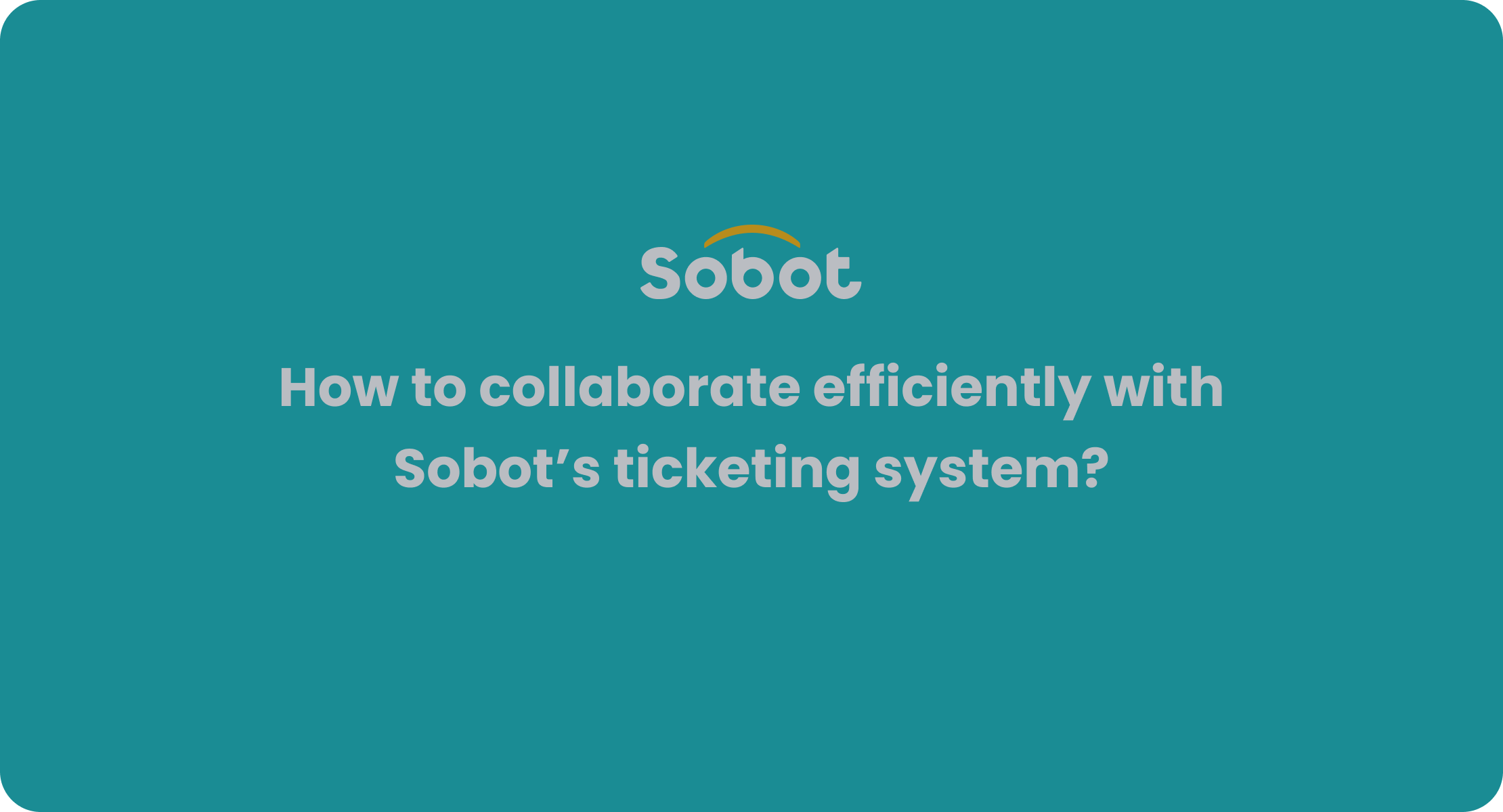
Sobot Ticketing System Overview
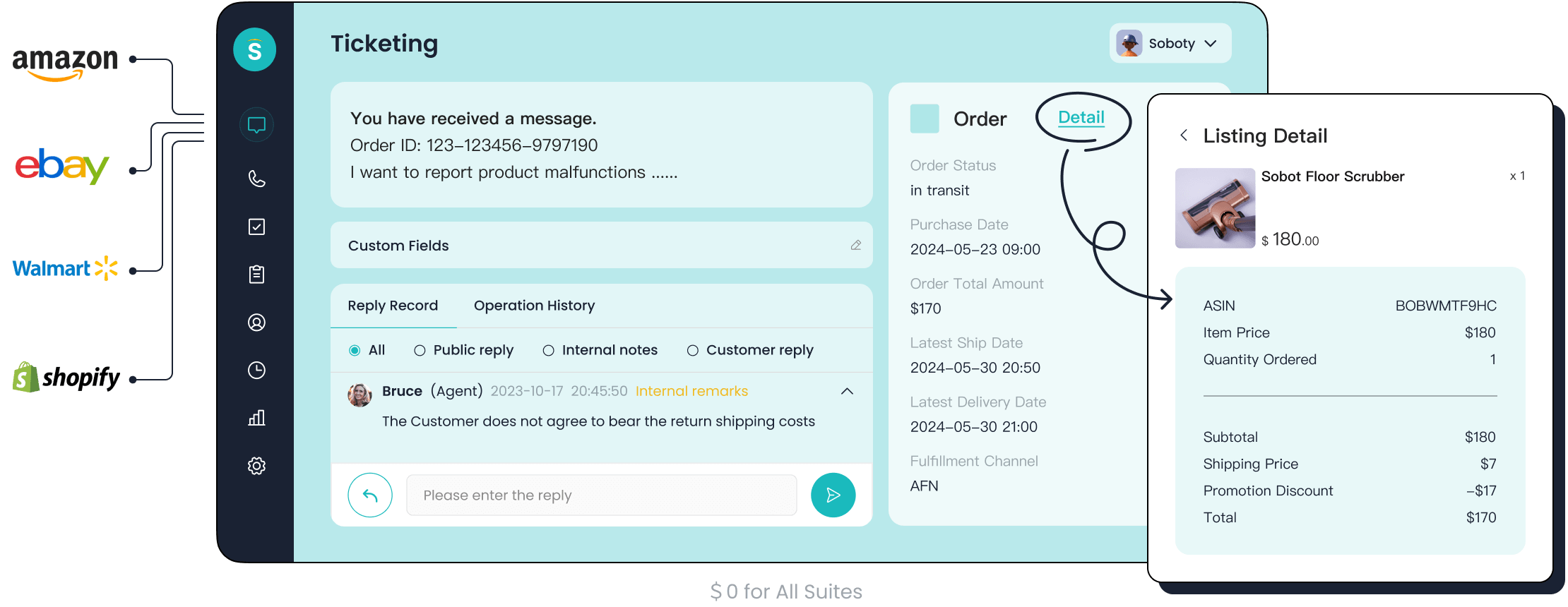
Sobot’s ticketing system stands out in the customer service industry by addressing common support challenges with advanced crm software. The platform uses AI-powered intelligent outbound calls to reduce manual outreach, cutting labor costs by 50% and boosting efficiency by 200%. Multi-channel customer contact, including chatbot receptionists, ensures customers receive quick and accurate responses. Sobot’s system integrates with internal platforms like ERP and crm, creating seamless data connections and automating processes. The omni-channel customer service workbench unifies communication channels, supports multiple languages, and improves the global customer experience.
| Core Functionality | Customer Support Challenges Addressed | Benefits and Impact on Support Quality and Efficiency |
|---|---|---|
| AI-powered intelligent outbound calls | Labor-intensive manual outreach; lack of linked data for efficient calls | 50% reduction in labor costs; 200% increase in efficiency; 150%+ sales growth |
| Multi-channel customer contact with chatbot receptionist | Need for intelligent reception system; fragmented communication channels | Omni-channel workbench; improved first-contact resolution; enhanced service quality |
| Internal service sharing with system integrations (ERP, CRM, portals) | Disconnected internal platforms; lack of unified customer data access | Seamless data connection; process automation; improved internal management |
| Omni-channel customer service workbench | Disjointed customer interactions across platforms | Unified communication channels; multi-language and timezone support; better global customer experience |
Organizations using Sobot’s ticketing system report a 30% reduction in customer service costs and a 52% faster ticket resolution time. These improvements come from AI automation, intelligent ticket routing, and minimized manual triage.
Omnichannel Solution for Customer Experience
Sobot’s omnichannel customer support solution integrates web chat, mobile apps, social media, messaging, email, and voice. Customers can switch between channels without losing context, ensuring a consistent experience. The platform uses AI technologies like natural language processing and sentiment analysis to deliver personalized and empathetic support. Integration with crm software and business tools through APIs enables real-time analytics, intelligent routing, and knowledge base management. Sobot’s emotion-aware chatbots and AI-powered voice assistants detect customer sentiment, providing more human-like service. Companies using Sobot’s omnichannel solution see an average customer retention rate of 89%, compared to 33% for weaker engagement strategies.
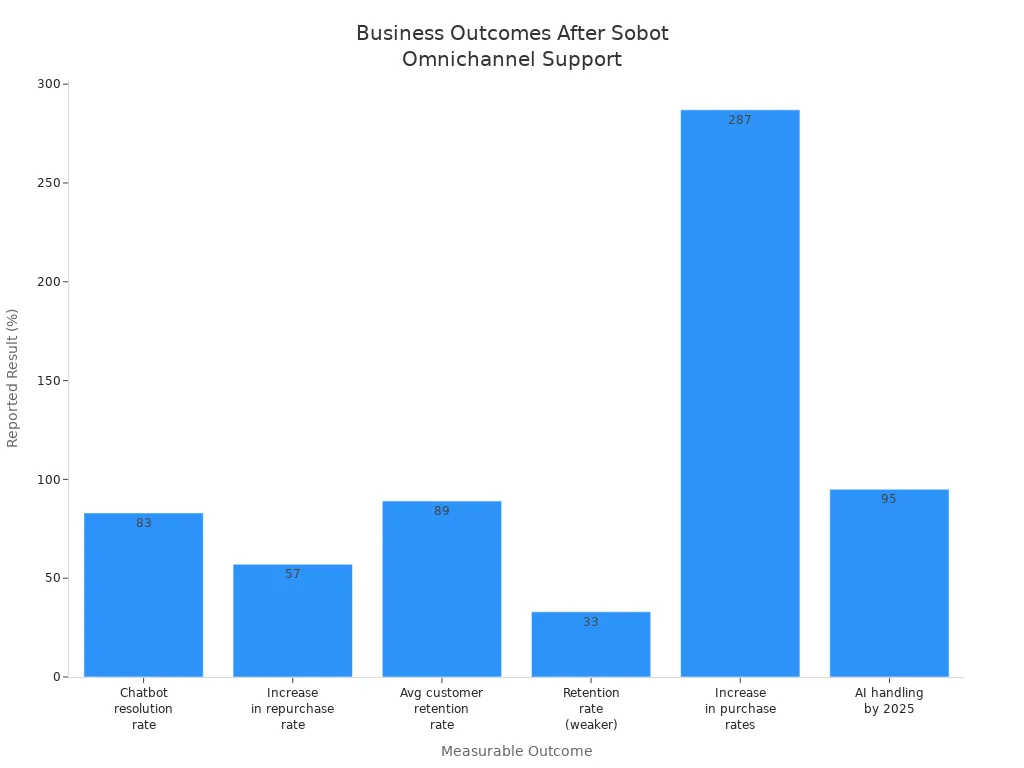
OPPO Success Story
OPPO, a global leader in smart devices, partnered with Sobot to transform its customer support operations. After implementing Sobot’s AI-powered crm software, OPPO achieved a 15% reduction in churn rate and a 20% increase in customer satisfaction. The company also saw a 25% drop in customer complaints and a 30% boost in satisfaction through AI-driven natural language processing. Sobot’s predictive analytics helped OPPO identify at-risk customers and deliver proactive support. The system’s stability reached 99.99%, supporting over 6 million daily online communications. OPPO’s Net Promoter Score increased by more than 35%, and conversion rates rose by over 15%. These results highlight the power of Sobot’s crm-driven solutions in elevating customer experience and service quality.
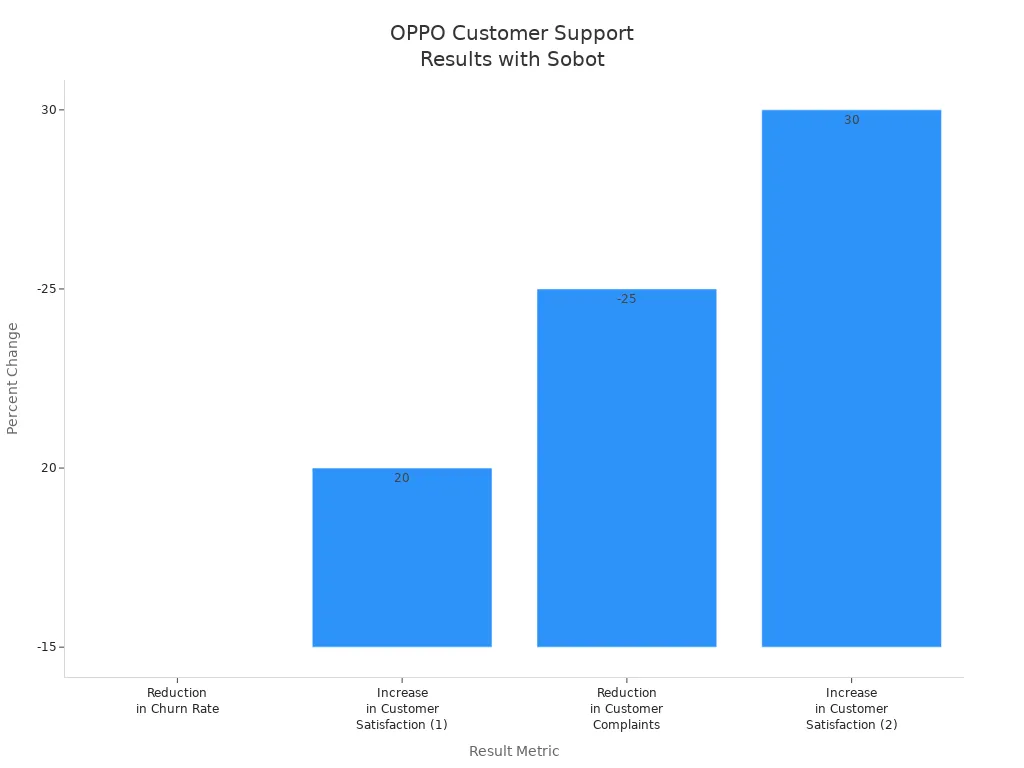
Customer Support Software Comparison
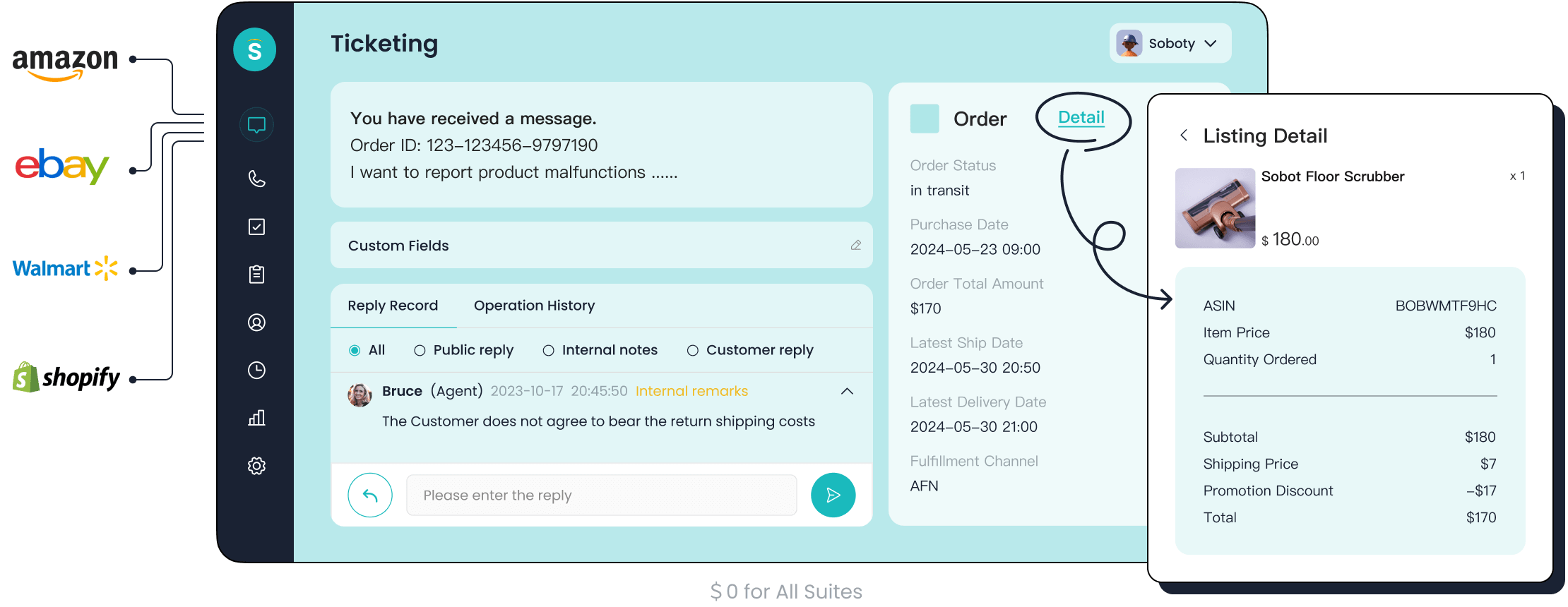
Feature Table
Selecting the right customer support software can transform how teams deliver service. Leading platforms offer a range of features that help businesses manage customer interactions, automate workflows, and improve agent productivity. The following table compares key features of top customer service software solutions, including Sobot, to help organizations make informed decisions:
| Software Solution | Omnichannel Support | AI Automation | CRM Integration | Analytics Dashboard | Scalability | Unique Strengths |
|---|---|---|---|---|---|---|
| Sobot | Yes | Yes | Yes | Yes | High | Unified workspace, multilingual, e-commerce ready |
| Zendesk | Yes | Yes | Yes | Yes | High | Extensive integrations, customizable workflows |
| Freshdesk | Yes | Yes | Yes | Yes | Medium | Free plan, collaboration tools |
| Service Cloud | Yes | Yes | Yes | Yes | High | Advanced automation, deep CRM connectivity |
| LiveAgent | Yes | Limited | Yes | Yes | Medium | Built-in CRM, WhatsApp integration |
Sobot stands out with its intuitive design, AI-powered automation, and robust omnichannel support. The platform’s analytics dashboard provides actionable insights, while its scalable infrastructure adapts to both small and large organizations. Sobot’s customer service software integrates seamlessly with e-commerce and CRM software, making it a versatile choice for businesses seeking efficiency and growth.
Pricing and Scalability
Pricing plans for customer service software vary by provider and feature set. Zendesk offers tiered pricing, starting at $25 per user per month, with higher tiers unlocking advanced features. Freshdesk provides a free plan for up to 10 agents, with paid plans starting at $18 per user per month. Service Cloud and Sugar Serve target larger organizations, with pricing reflecting advanced CRM software integration and workflow automation.
Sobot delivers flexible pricing options tailored to business needs. The platform supports both startups and enterprises, ensuring cost-effectiveness and scalability. Sobot’s infrastructure grows with the organization, handling millions of daily interactions without compromising service quality. This adaptability makes Sobot’s customer support software a strong fit for companies aiming to scale operations and enhance customer experience.
Tip: When evaluating customer service software, consider not only the pricing plan but also the platform’s ability to integrate with existing CRM software and support future growth.
How to Choose Customer Support Management Tools
Key Features to Consider
Selecting the right customer support management tool requires a clear understanding of essential features. Industry experts recommend evaluating tiered functionality based on business size and customer touch model. Companies should look for tools that offer:
- Dashboards with a 360-degree customer view.
- Customer health scoring and adoption tracking.
- Automation for ticket management and workflow optimization.
- Customizable reporting and analytics.
- Integration capabilities with crm software and third-party platforms.
- Security features, including data storage location and authentication integration.
A robust customer support management solution should include omnichannel support, a knowledge base, self-service options, and reporting tools. Sobot’s customer service software provides unified ticket management, multilingual support, and AI-powered automation, helping organizations streamline service operations and improve customer satisfaction. Experts advise asking detailed questions during demos about functionality, security, and extensibility to ensure the tool aligns with business needs.
Tip: Align the tool’s features with your business size, customer relationship management strategy, and maturity level for optimal results.
CRM and Integration Needs
Integration with crm solutions is critical for seamless workflows and efficient support. Businesses of all sizes benefit from connecting customer support tools with crm software to centralize customer data and track interactions. The following table highlights how different segments address crm and integration needs:
| Business Size | CRM Features and Focus | Integration Needs and Strategy | Additional Considerations |
|---|---|---|---|
| Solopreneurs/Startups | Cloud-based crm software, ease of use, scalability | Integration with accounting and invoicing tools | Quick support, budget constraints |
| Small Businesses | Contact management, sales tracking, marketing automation | Email, calendar, marketing, and accounting software integration | Data security, compliance, KPI measurement |
| Midsized Businesses | Customization, workflow automation, advanced reporting | Communications, HR, and marketing software integration | Dedicated crm support resources |
| Enterprises | Highly customized crm solutions, ERP integration | Multiple business applications, seamless data flow | Full crm teams, training, KPI tracking |
Sobot’s crm support integrates with platforms like Salesforce and Shopify, enabling businesses to unify customer data and automate service processes. Cloud deployment offers flexibility and ease of integration, while on-premises solutions provide greater control and security.
Scalability and Usability
Scalability and usability are vital for long-term success. Top customer support management tools feature multi-layer encryption and regulatory compliance, ensuring secure scaling. Seamless integration with existing tech stacks reduces friction and boosts efficiency. User-friendly interfaces with intuitive dashboards and minimal onboarding friction enhance usability. Flexible pricing and scalable licensing models support cost-effective growth.
Sobot’s customer service software demonstrates scalability by supporting over 6 million daily online communications and maintaining system stability at 99.99%. The platform’s modular design and user management capabilities allow organizations to expand from small teams to large enterprises without performance loss. Companies should define clear goals for their knowledge base, choose software with rich usability features, and structure content intuitively to facilitate easy navigation.
Note: Prioritize tools that grow with your business and maintain ease of use, security, and data integrity.
Trends in Customer Experience and Support
AI and Automation
AI and automation have become essential in customer support and service. In 2025, 29% of organizations use generative AI for customer service, and 71% of leaders plan to invest more in AI chatbots (Capgemini, HubSpot). AI-powered chatbots now handle complex inquiries, reducing wait times and improving efficiency. These chatbots provide 24/7 self-service, allowing customers to solve problems anytime. AI voice analytics detect emotions and intent, helping agents respond with empathy. Intelligent routing directs tickets to the right agent, reducing escalations and improving first-contact resolution. Sobot’s AI-driven platform automates ticket management and uses analytics to boost agent productivity. Automation leads to measurable results:
| Metric | Impact of Automation |
|---|---|
| Increase in repeat purchases | 36% |
| Reduction in first response time | 37% |
| Reduction in resolution time | 52% |
| Decrease in ticket-to-order ratio | 27% |
| Increase in customer satisfaction | 1% |
| Increase in conversion rate | Up to 12% |
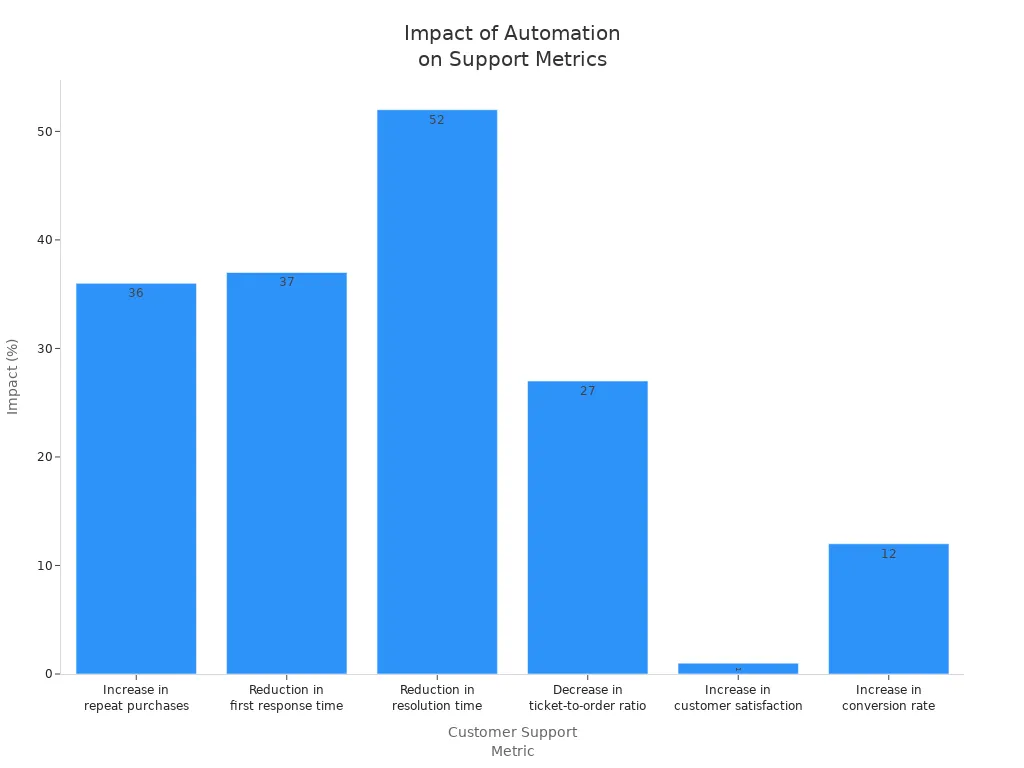
“Before, agents had to handle it all. Now, they rarely take a ticket about frequently asked questions. They’re only handling escalations, special product-related questions, and things like that.” — Caela Castillo, Director of Customer Experience, Jaxxon
Omnichannel and Self-Service
Omnichannel support is now a standard feature in leading customer support management solutions. Businesses connect with customers across web, mobile, social media, email, and voice, creating a seamless customer experience. Eighty percent of customers say digital experiences are as important as the product itself (GlassBox). Sobot’s omnichannel solution integrates all channels, ensuring agents have a unified view of each customer. This approach increases retention by up to 91%. Self-service is also transforming support. Customers use self-service portals, chatbots, and knowledge bases to find answers quickly. Self-service support empowers users, reduces ticket volume, and allows agents to focus on complex issues. Key benefits of self-service include:
- 24/7 availability and convenience
- Faster issue resolution and consistent information
- Lower support costs and improved agent productivity
- Personalized experiences and increased customer satisfaction
Self-service technology automates routine tasks, making support teams more efficient. Sobot’s self-service tools offer multilingual support and real-time analytics, helping companies improve their service and customer experience.
Analytics and Reporting
Analytics and reporting play a crucial role in modern customer support and service. Advanced analytics platforms unify data from multiple sources, providing real-time insights and predictive analytics. Businesses use these tools to understand customer needs, optimize processes, and improve service quality. Sobot’s analytics dashboard tracks key metrics like response time, resolution rate, and customer satisfaction. Companies that use analytics see better customer retention, higher revenue, and improved operational efficiency. The table below shows how analytics drive business outcomes:
| Measurable Business Outcomes | Description | Key Performance Indicators (KPIs) |
|---|---|---|
| Improved Customer Experience | Analytics help tailor services, leading to higher satisfaction and repeat purchases. | CSAT, NPS, CES, Sentiment Analysis |
| Operational Efficiency | Analytics optimize processes and reduce response times. | ART, AHT, First Contact Resolution, Agent Case Volume |
| Customer Retention and Loyalty | Understanding behavior increases loyalty and retention. | Retention Rate, CLV |
| Product and Service Improvements | Feedback guides enhancements. | Sentiment Analysis, Feedback Analysis |
| Identification of Pain Points | Analytics reveal recurring issues for proactive resolution. | Diagnostic Analytics, Complaints Analysis |
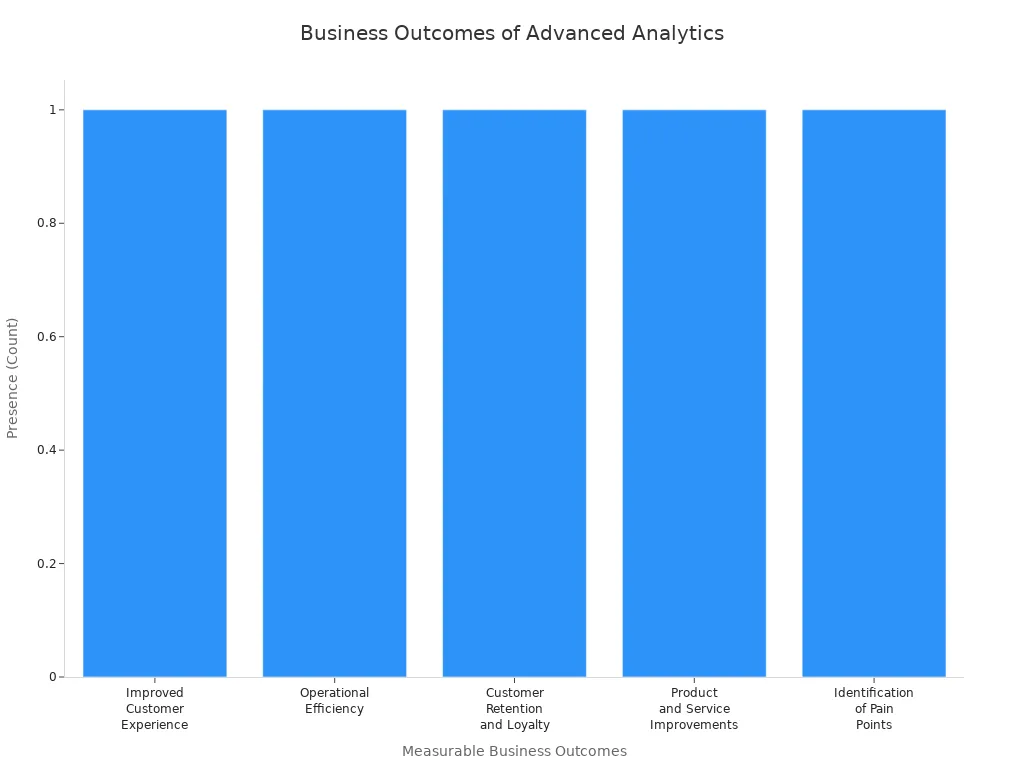
Sobot’s crm integration and analytics help organizations make data-driven decisions, improve self-service resources, and deliver a superior customer experience.
Top customer support management solutions deliver unified crm integration, real-time AI coaching, and customizable dashboards. The table below highlights key research findings:
| Key Takeaway | Explanation |
|---|---|
| Unified data integration | Combines QA, crm, WFM, coaching, and surveys for a complete view. |
| AI-powered coaching | Delivers personalized actions and automated quality assurance. |
| Customization | Adapts to business goals with role-based dashboards. |
| Gamification | Motivates agents with points and badges. |
Businesses should align their support platform with customer experience goals by selecting metrics like NPS or CSAT, building cross-functional teams, and leveraging crm technology. Sobot’s service platform offers scalable support, omnichannel crm integration, and actionable analytics. Next steps include testing free trials, evaluating reporting tools, and planning for future scalability. Stay informed on service trends by following industry blogs and webinars (TextMagic).
FAQ
What is the main benefit of integrating a crm with customer support service platforms?
A crm helps teams track every customer interaction across all service channels. This integration gives agents a complete view of each customer’s history. Companies using crm with service tools see up to 35% higher customer satisfaction scores (Salesforce Research).
How does Sobot’s crm integration improve service efficiency?
Sobot’s crm integration connects all service channels, including chat, email, and voice. Agents access unified customer data in real time. This approach reduces ticket resolution time by 52%. Sobot’s crm-driven service platform also supports multilingual communication, which helps global teams deliver consistent service.
Why is omnichannel service important for modern crm strategies?
Omnichannel service lets customers reach support through their preferred channels. A crm with omnichannel features tracks every interaction. This strategy increases retention rates by up to 91%. Sobot’s omnichannel service solution ensures seamless transitions between chat, email, and voice, improving the overall crm experience.
What role does AI play in crm-based service platforms?
AI automates repetitive service tasks in crm systems. It routes tickets, drafts responses, and analyzes customer sentiment. Companies using AI in crm service platforms report a 37% reduction in first response time. Sobot’s AI-powered crm service tools help agents focus on complex issues and improve customer satisfaction.
How can analytics in crm service platforms drive business growth?
Analytics in crm service platforms provide insights into customer behavior and agent performance. These insights help companies identify trends and improve processes. Sobot’s crm analytics dashboard tracks key service metrics, such as CSAT and NPS, enabling data-driven decisions that boost revenue and customer loyalty.
See Also
Evaluating Artificial Intelligence Solutions For Enterprise Call Centers
Best Contact Center Platforms Analyzed For The Year 2024
Effective Strategies For Managing Call Center Quality Standards
Leading Customer Support Software Options Ranked For 2024
Comprehensive Overview Of Omnichannel Software For Call Centers
